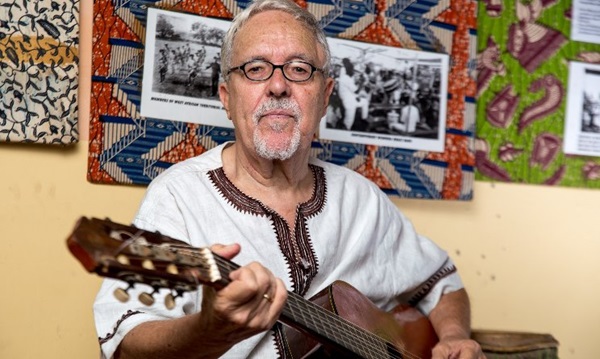
Cultural colossus John Collins is 80
Last Saturday saw the celebration of Ghanaian music ethnographer Prof. John Collins at the +233 Jazz Bar in Accra. The well-attended soiree marked his 80th birthday in a musically huge way. On stage to delight highlife patrons were Bessa Simons, Gyedu Blay Ambolley and Paulina Oduro.
Other performers who mounted the stage to honour Collins were Atongo, Thomas the Violinist and Osei Korankye the seprewa man.
The British-born Collins who has lived in Ghana since the 1960s has played, recorded, administered, taught and researched the highlife music genre. Most of the artists who mounted the stage paid tribute to his impact on their careers.
He was a member of the Concert Party movement. John Collins is a founding member of MUSIGA. “From Britain to Bokoor’’ a biography on his life journey so far written by Bertha Setor Adom was available for sale. Patrons left the +233 Jazz Bar tribute fulfilled and delighted for this gift of a man
John recalled that his father, Edmund Collins and Professor J. H. Kwabena Nketia, both joined the University in 1952. The two used to invite guitar bands and traditional musicians to perform for them on the University campus.
Lecturers from the various departments loved to watch the performances and Nketia and John’s father formed the University Music Society which was later joined by Professor Atta Annan Mensah, the first Head of the Music Division of the School of Music, Dance and Drama and Robert Sprigge of the History Department.
The renowned choral composer Ephraim Amu also joined the Society whilst still Head of the Music School at the then Kumasi University College before he was eventually appointed a member of staff of the Institute of African Studies in 1961. Musical evenings were held at the Achimota Junior Common Room that featured local highlife guitar bands like Yamoah’s, E. K. Nyame’s, Onyina’s and T.D.B. Agyekum and the Happy Stars.
Collins recalled the names of some of the students who attended these Ghana Musical Society sessions where palmwine was served such as Kwesi Wiredu who played guitar and later became a philosopher, and Kwadwo Donkoh who later became a diplomat and a highlife composer and promoter.
Mr. Collins Senior lived and taught in Ghana until he retired in the late 1970s. Collins said by then, his father had built a farmhouse (later called Bokoor House where John currently lives) and started a farm at Ofankor, eight miles North of Accra using his local pension after retiring from full-time work at the University of Ghana’s Department of Philosophy. Edmund Collins finally went back to the UK in 1983 and died there in 1991, with his ashes being returned by John to Ghana.
Shortly after arriving in Ghana and even before he began his university studies, John had met Mr Bampoe, the leader of the Jaguar Jokers (JJs) concert party in August 1969 at his stepmother’s house at Adoagyri near Nsawam in the Eastern Region.
This brought a remarkable turn in his musical life. In Britain, John was playing the guitar and harmonica in several jazz, blues and a rock band in England. But through the Jaguar Jokers Band, he was introduced to African highlife, Afro-rock, Congo Jazz and Afro-beat, as well as non-African genres then popular in Ghana.
‘’I showed Bampoe some of the blues and rock licks that I played and so he invited me to join the guitar band section of his troupe that was about to go on a one week tour of the smaller towns and villages in the area. I would learn highlife and he would use me as a novelty eye-catcher to draw in crowds as, up to that time, no white person had ever toured with a concert party.’’
So within a week of arriving in Ghana, Collins was on the road with twenty other artists travelling by mini-bus loaded with musical instruments, stage lights and a portable electricity generator, as many of the villages had no electricity at that time. Many also didn’t have a stage - so simple village ‘compound houses’ sufficed, as the rooms form a rectangular space around the inner courtyard or compound — a perfect temporary performance space.
"Anytime we arrived at a venue I would be taken around the area to play with a drummer on the touring bus to help draw a crowd." The Jaguar Jokers musical plays themselves dwelt on the clash between old customary ways and modern urban life, and so pitted illiterate rural farmers against urbane taxi drivers and lawyers speaking ‘big English.‘, angels against forest devils, the humble orphan and his or her ‘spoilt’ siblings who became drunkards or ‘goodtime’ girls. Incidentally, due to the rough life on the road these female parts were performed by lady impersonators. The musical plays ended with a moral lesson spelt out by one of the
From the first day JJs featured John as a unique commercial attraction for their business because he was white skinned. His meeting with Mr. Bampoe turned out to be motivating; it changed the course of John’s life altogether as it turned him into a highlife musician, a band leader, a recording engineer, a research scholar, author, archivist and lecturer.
